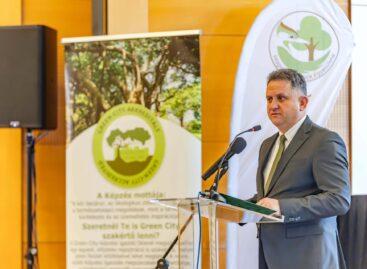The green ideology established in agriculture prevents competitiveness
The extreme green ideology that has settled on European agriculture completely prevents competitiveness and the future of EU agriculture, the Hungarian Minister of Agriculture stated in Brussels on Tuesday.

(Photo: AM)
Speaking to Hungarian journalists after the meeting of the ministers of agriculture of the member countries, István Nagy emphasized that the EU’s agricultural policy, burdened with green ideology, is dangerous not only for farmers, but also for consumers, since agricultural products produced in the midst of uncontrolled conditions from Ukraine enter the markets of the European Union in unlimited quantities, without any customs duties. At the same time, the minister called Tuesday’s adoption of the amending proposals for simplifying the common agricultural policy (KAP), easing the administrative burden of farmers and improving production conditions, a “great achievement”. Explaining the details, he highlighted, among other things: according to the accepted proposals, in case of non-compliance with the CAP rules, farmers with a production area of less than 10 hectares are exempted from all controls and sanctions.
It will not be mandatory to defoliate or set aside the area
Those farmers who have already planned the fallowing will be compensated. Instead of crop rotation, it will be sufficient to apply crop diversification. The measures will be in effect until the end of the cycle of the Common Agricultural Policy, i.e. until 2027. This can ensure predictability and a vision for the future for European farmers – underlined the minister. István Nagy emphasized that the Hungarian government has done everything to implement proposals that simplify and make European agriculture feasible. Hungary used more than 45 amendment proposals to make production conditions simpler. The accepted proposals are fully in line with the positions of the Hungarian agricultural administration, he said. At the same time, the minister said: the problem is still caused by the import of large quantities of cheap grain products flowing into Europe from Ukraine, with which European farmers cannot compete. Ukrainian agricultural products displaced the products of European farmers – he pointed out. He said: according to Ukrainian information, the Black Sea ports are open again, and more than 17 million tons of grain have already left the territory of Ukraine. If the sea route is free, protecting European Union markets, the EU can impose restrictions on Ukrainian agricultural products in such a way that they do not harm Ukraine, and even help the products return to their traditional markets, the Middle East, Asia and Africa – he opined. Regarding the import of Ukrainian agricultural products into the EU, he stated: Hungary firmly insists that the issue of trade in cereals and oilseeds be settled within the framework of the autonomous trade liberalization measure (ATM Regulation), since – he pointed out – the main problem is caused by these products. “Hungary will reject the amendment of the decree as long as grain and oil crops are not included in its scope,” said the Minister of Agriculture. If the issue of trade in these products is not resolved, the Hungarian government will continue to maintain its relevant decision under national authority and will not allow Ukrainian agricultural products into the territory of the country, because “we owe so much to the Hungarian farming community,” stressed István Nagy.
MTI
Related news
Walnuts are available at incredible prices
🎧 Hallgasd a cikket: Lejátszás Szünet Folytatás Leállítás Nyelv: Auto…
Read more >Related news
OKSZ on the extension of the margin stop decree
🎧 Hallgasd a cikket: Lejátszás Szünet Folytatás Leállítás Nyelv: Auto…
Read more >








